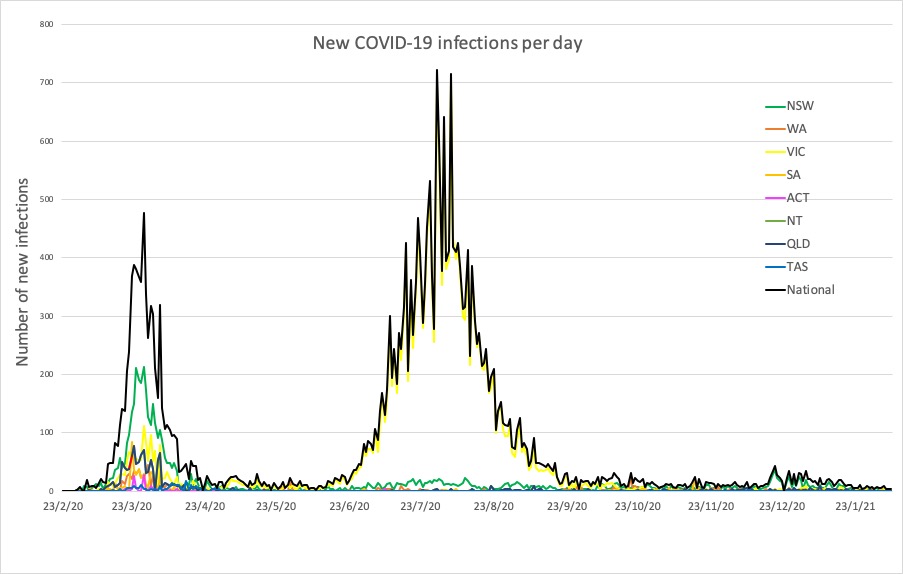And data from the US suggests the UK variant is spreading rapidly.
Welcome to The Medical Republic’s COVID Catch-Up.
It’s the day’s COVID-19 news in one convenient post. Email bianca@biancanogrady.com with any tips, comments or feedback.
8 February
- Results from South African trial of Oxford-AstraZeneca vaccine delivers uncertain results.
- Chinese CoronaVac phase 3 results suggest high efficacy against severe disease.
- UK trial of Oxford-AstraZeneca vaccine suggests similar effect against UK variant in reducing viral load and duration.
- UK variant is spreading rapidly across the United States, with significantly higher transmissibility.
- Another quarantine hotel staff tests positive in Victoria, and an individual in NSW tests positive after release from quarantine.
- Latest confirmed COVID-19 infection numbers from around Australia.
A lot of vaccine news happened over the weekend, so here’s a summary:
A phase 1/2 trial of the Oxford-AstraZeneca COVID-19 vaccine in South Africa has delivered uncertain results against the South African strain of SARS-CoV-2 (B.1.351), prompting the South African government to announce it was halting roll-out of the vaccine.
The results, which were presented in a press conference on Sunday but are not yet published, suggested that the vaccine did not achieve a significant reduction in mild to moderate illness.
However Professor Shabir Madhi, an investigator with the study, from the MRC Vaccines and Infectious Diseases Analytics Research Unit in Johannesburg, told the conference that the study population were a relatively young, healthy group with a low level of the comorbidities that were associated with more severe outcomes from COVID-19.
As such, the study wasn’t designed to determine whether the vaccine would protect against severe COVID-19.
The trial also only tested participants for SARS-CoV-2 if they developed symptoms, so was not determining the true infection rate.
Results from the ongoing phase 2/3 study of the Oxford-AstraZeneca vaccine in the United Kingdom suggest the vaccine is similarly effective against the UK variant (B.1.1.7) as it is against the original SARS-CoV-2 variants, but the study’s outcomes are viral load and duration of positive nucleic acid results – nothing about severity or duration of illness.
The results were published in the non-peer-reviewed Lancet preprint server.
The UK variant of SARS-CoV-2 is rapidly spreading across the United States and research suggests it is significantly more transmissible than original variants of the virus.
A study published in the non-peer-reviewed preprint server MedRxiv examined more than half a million SARS-CoV-2 samples collected across the US since July 2020, looking for a key mutation associated with the UK variant
The analysis suggested an increased growth rate of the UK variant compared to non-UK-variants, which translated to an increased transmissibility of 35-46% and a doubling in infections every 10 days.
A Wollongong resident has tested positive for SARS-CoV-2 two days after being released from two weeks in hotel quarantine, according to an update from NSW Health.
The individual had returned from overseas, and received two negative tests during their 14-day quarantine period. The positive result suggested a ‘low level’ of infection, NSW Health said, and so far no close contacts of the individual have tested positive.
However the person did visit a number of hospitality venues in the area after their release from hotel quarantine (I mean, who wouldn’t?).
The case has prompted NSW Health to introduce further follow-up testing after travellers have been released from hotel quarantine.
Meanwhile another case has emerged among quarantine staff, this time at the Holiday Inn at Melbourne airport. The woman had tested negative at the end of her shift on February 4, but developed symptoms shortly after returning to work on February 7 and tested positive.
Here are the latest confirmed COVID-19 infection numbers from around Australia to 9pm Sunday:
National – 28,850 with 909 deaths
ACT – 118 (0)
NSW – 5120 (1)
NT – 102 (1)
QLD – 1312 (1)
SA – 602 (0)
TAS – 234 (0)
VIC – 20,455 (0)
WA – 907 (0)



